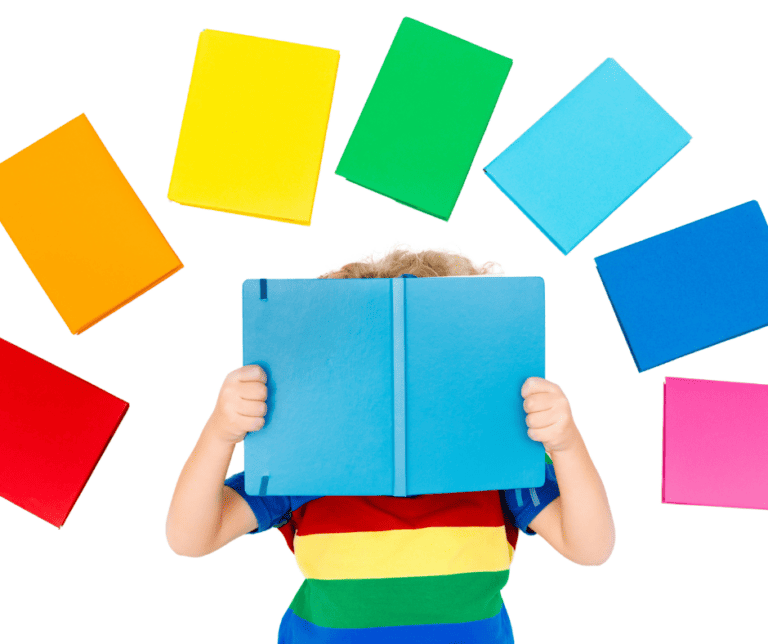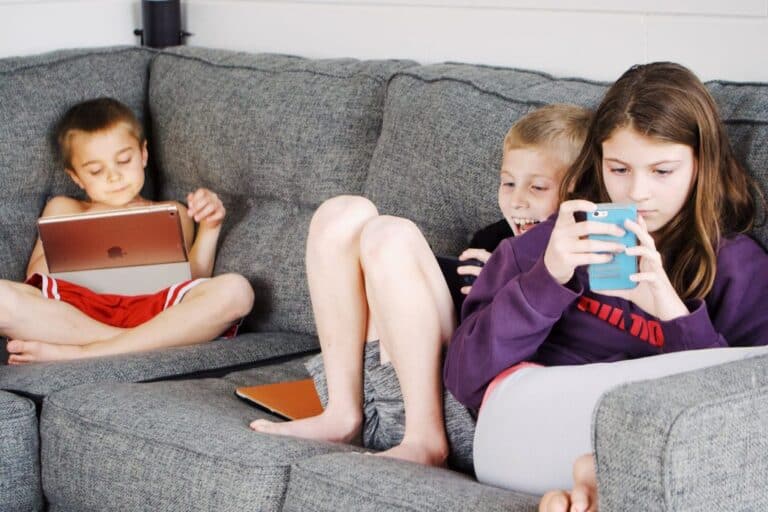7 Highly Effective Early Literacy Tips For The Busy Parent
We may earn money from the products/companies mentioned in this post. As an Amazon Associate I earn from qualifying purchases. For more information, read our Terms & Disclosures.
Early Literacy Tips
Let’s talk about early literacy, you know, that moment when your little one first recognizes letters, and begins to understand that those letters create words, and those words?
Just last week, I was catching up with my sister, who recently became a mother.
As we chatted over the phone, she expressed her excitement…and, let’s admit it, a bit of panic about fostering a love of reading in her son.
And then she said, “Gosh, I barely have time to shower; how on earth will I manage to teach him to read?”
Can I get an amen to the idea that parenting is a full-time gig?
There’s the joy of first steps, the thrill of first words, the satisfaction of a healthy home-cooked meal gobbled down… All that jazz!
Maintaining a work-life balance can be tough, but it becomes a work-life-kids balance when you’re a parent.
Oh boy!
There’s a ton about parenting that the ‘gram-worthy pics don’t show…
Like those days when you’re sleepily nursing a cup of reheated, thrice-microwaved coffee.
Or when you read the same picture book so often, you start seeing talking animals in your dreams.
And don’t even get me started on deciphering toddler-speak! (“No, honey, ‘gaga’ isn’t a word in our story today.”)
We do what we’ve got to do, right?
With that said, it can be a bit tough to squeeze early literacy activities into your already packed schedule.
But, worry not; I’ve got 7 highly effective early literacy tips for the busy parent.
Buckle up because it’s time to hit the ground running!
7 Highly Effective Early Literacy Tips: A Busy Parent’s Quick Guide

Hey, I totally get it. As a parent who’s always on the go, finding those precious moments (and energy!) to actively engage in your child’s early literacy journey can feel like a herculean task.
But here’s the deal
Establishing a solid base in reading and language is crucial for your little one’s lifelong success in academia and beyond.
So, how about we make every second count?
Here are seven early literacy tips that are super effective and can seamlessly blend into the daily hustle and bustle of the busiest parents.
From my own experience, I’ve discovered that sprinkling our home environment with loads of language opportunities has been instrumental in nurturing my kiddo’s early literacy skills.
One method that has really worked wonders is weaving reading into our day-to-day activities.
Like cracking open a storybook during bedtime or spinning a tale at family dinners.
By infusing our routine with these literacy moments, I’m showing my child that reading is not just fun, but it’s a big deal!
Moving on to another key part of early literacy: honing in on oral language development and phonemic awareness.
To help my little one get a grip on sounds and how to play around with them, we indulge in rhyming games and experiment with different ways of saying hello.
These activities pump up their oral language skills.
Also, I make it a point to use ‘grown-up’ language when chatting with my child – it’s a subtle nudge for them to pick up and mimic correct language use.
These tiny tweaks in our day-to-day life have built a sturdy platform for my child’s early literacy skills, setting them up for a lifetime love of learning.
The Importance of Early Literacy
Puzzle Pieces of Language
Now, this isn’t me getting all academic about the importance of early literacy.
But, let me be real for a moment.
Being a parent, I get it – how absolutely pivotal early literacy can be in shaping a child’s language development.
Much like how you pick up the nuances of a hot gossip at the cafe, kids, right from their diaper days, start picking up on the rhythm and rhyme of our day-to-day conversations and shared reading shenanigans.
I change up their learning experience by bringing in books tailored to their age, experimenting with storytelling, and messing around with sight words.
And voila, it’s like a backstage pass to building their listening skills and both receptive and expressive vocabulary!
Then we got phonemic awareness activities, those little games that are all about recognizing and juggling sounds in words.
You see, these not only help in language development but also deepen their understanding of the alphabet.
It’s like crafting a cozy reading nook at home, packed with all things literacy.
And boom!
You’re nurturing your child’s reading habits and supporting their language growth in a fun and engaging way.
Long-Term Educational Benefits
Okay, so here’s the scoop.
Early literacy skills pack a pretty mean punch when it comes to long-term educational goodies for the kids.
Investing some time in my child’s early literacy, be it through early childhood education, interactive reading activities, or pre-school reading programs;
it’s like placing the right bet.
We’re talking about a serious boost in their academic achievements, lower chances of them repeating grades, and higher odds of them actually graduating.
By sprinkling these early literacy tips into my ever-so-busy schedule, I’m not just forging a strong bond with my little one. I’m laying the groundwork for their educational success and kindling a lifelong love for reading and learning.
Now how’s that for a win-win?
What are some highly effective early literacy tips?

Reading Aloud Daily
One of the best early literacy tips I can recommend is reading aloud to your child daily.
This practice not only helps to strengthen their language skills, but it also encourages bonding and fosters a love for books.
By incorporating reading into our daily routine, we’re enabling our children to become familiar with different words, sentence structures, and storylines.
This, in turn, boosts their language development and comprehension abilities.
Incorporating Print Materials
Another effective strategy is using a variety of print materials for early literacy.
This means exposing our children to not only books but also magazines, newspapers, and even product packaging.
We help our kids understand how text is used in different contexts.
Making time for reading
As a busy parent, I understand the struggle to balance work, family, and personal time.
However, making time for reading is essential to our children’s literacy development.
Start by designating a special “story time” each day, even if it’s just for 10 minutes, this can significantly impact our kids’ reading abilities.
We can also use technology to our advantage by utilizing audiobooks or interactive reading games during car rides or while waiting at appointments.
Introducing new vocabulary
Building vocabulary in children is another crucial aspect of early literacy.
I like to introduce new vocabulary words during our daily reading time and encourage my child to use them in conversation.
This can also be done throughout the day by pointing out and discussing new words encountered in everyday life.
Engaging in phonics activities, language development games, and teaching sight words for kids can also play a significant role in expanding their vocabulary.
With these tips and actively participating in our child’s literacy development, I believe we can pave the way for their future success in reading and writing.
Encouraging Language and Listening Skills

Interactive Storytelling
Now, what’s a surefire way to bolster those language and listening skills in your kiddo?
I’m talking interactive storytelling.
I’m knee-deep in a thrilling tale with my child, and I toss in some open-ended questions, nudging them to guess what’s lurking around the corner.
It’s like turning on the switch to their listening comprehension and cranking up their chat skills.
By injecting life and fun into storytime, I’m not just reeling them into the world of books, but I’m also amping up their language skills.
Singing and Rhyming Activities
Let’s not forget the magic that is music in the grand scheme of early literacy development.
Much like that catchy tune at the cafe, I pepper our daily routine with singing and rhyming activities.
This sparks their phonemic awareness, almost like lighting up a literary neon sign.
Nudging my kid to brainstorm words that rhyme with a certain sound or word – it’s a surefire way to jazz up their language skills.
Plus, belting out nursery rhymes and songs is like their VIP pass to the beat and structure of language, an absolute must for nailing reading and writing.
Playing Language Games
Now, consider language games your secret weapon in turbocharging your kiddo’s listening and language skills.
It’s like the ‘I Spy’ of literacy
I give a description of something in the room, and they’ve gotta guess what it is based on those clues.
It’s like their listening skills are doing bench presses, and their vocabulary’s running the treadmill.
And word games?
Those are like brain gym for phonemic awareness ; a crucial stepping stone to becoming a reading champ.
As a parent juggling a million things at once, I’ve found these activities to be a goldmine.
They’re a hoot and a half, and they put my kiddo on the fast track to early literacy.
Tackling interactive storytelling, singing and rhyming, and language games lets me nudge my kid’s language and listening skills up a notch while having a ball.
These pointers in your back pocket, even the busiest of parents can pave the way for strong early literacy skills in their children.
Stimulating Imagination and Creative Thinking
Asking Open-Ended Questions
Asking questions without borders is an awesome way to kick your kiddo’s imagination into overdrive
These are like brain exercises that get their creative and critical thinking juices flowing.
Let’s say we’re diving into a story together. I might toss out questions like, “What do you think is going to go down next?” or “How’d you feel if you were in the shoes of this character?”.
These questions prompt kids to deep-dive into the plot and characters, broadening their reading skills, vocabulary, and emotional insight.
Exploring Characters and Plots
I also make a habit of diving into characters, their drives, and emotions in stories.
Post-story, we hash out how different characters might’ve felt in certain scenarios and why they went the way they did. This doesn’t just teach empathy; it gives children a front-row seat to plot structure and dynamics. Sometimes, we even whip up our own tales or plot twists involving the same characters, giving their imagination, reading skills, and vocabulary a good workout.
Drawing and Writing Activities
Tossing drawing and writing activities into the mix can give your kiddo’s creativity and imagination a serious boost.
.This cements what they’ve just absorbed and gives them a canvas to paint their understanding and feelings.
And writing?
We often draft short tales, poems, or even basic sentences about their top characters.
This polishes their writing chops while feeding their imagination and creative thinking. Sometimes, to spice things up, I’ll spin some background tunes that set the stage for the story, tickling their senses and creativity even more.
Sprinkle these strategies into your daily routine, and you’ve got a recipe for revving up your child’s imagination, creativity, reading, and writing skills, no matter how swamped you may be.
Building a Reading Routine
As a busy parent, I understand the importance of developing early literacy skills in my child.
So, I make sure to build a reading routine that takes the beginning, middle, and end of the day into account.
In the early years, I try to read together with my child at least once a day, preferably during bedtime.
This helps them associate reading with a calm, relaxing time and instills a love of reading. I also make sure to read aloud to them, as hearing the words helps improve their attention span and language skills.
During the day, I encourage my child to explore their language skills independently — by playing with alphabet toys, looking at picture books, or visiting libraries.
This exposure to a variety of reading materials helps strengthen their early literacy skills.
I also implement these tips during our reading routine:
- Set a specific time: Establishing a consistent reading time helps make reading a habit for my child. I aim to read to them at the same time every day, whether it’s before bed or after dinner.
- Choose age-appropriate books: To keep my child engaged and interested, I make sure to select books that are suitable for their developing language skills.
- Ask open-ended questions: While we read together, I try to ask my child questions related to the story. This allows them to think critically and actively participate in the reading experience.
- Make it fun: I use different voices for characters and don’t shy away from using my imagination to create a fun reading environment that captures my child’s attention.
By following these strategies, I manage to build an effective reading routine and foster a love for reading in my child, despite my busy schedule.
Dusting Off Those Storybooks

I get it.
Balancing life, work, kids, and now this task of playing literacy instructor is a whole other level of multitasking.
You’re probably thinking, “As if I don’t have enough on my plate.” And hey, that’s okay.
Feeling a tad overwhelmed is perfectly normal.
It’s like the old saying, “How do you eat an elephant? One bite at a time.”
Take these tips, try them out one by one.
Maybe today, you try interactive storytelling.
Tomorrow, it could be a silly rhyming game.
You’ve got this. Trust me.
Remember, every song you sing, every word game you play, every character you explore, they’re all building blocks.
And, as they stack up, you’re not just crafting a reading-ready kid.
You’re molding an imaginative, creative thinker, a kid who’s going to ace school and beyond.
Got a favorite memory of introducing a book to your kid, or an ingenious personal technique that got them hooked on words?
Don’t keep it to yourself!
Share your stories in the comments below. Your tricks could be the guiding light for another parent.
It’s packed with fun activities that can turn reading time into an exciting adventure. Who knows, you might just raise the next J.K. Rowling or Roald Dahl!






